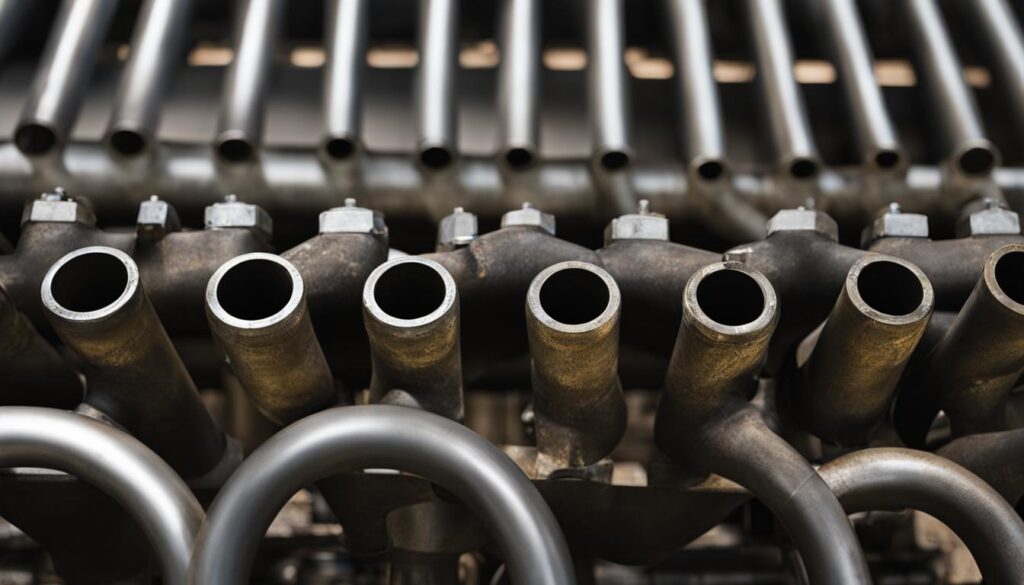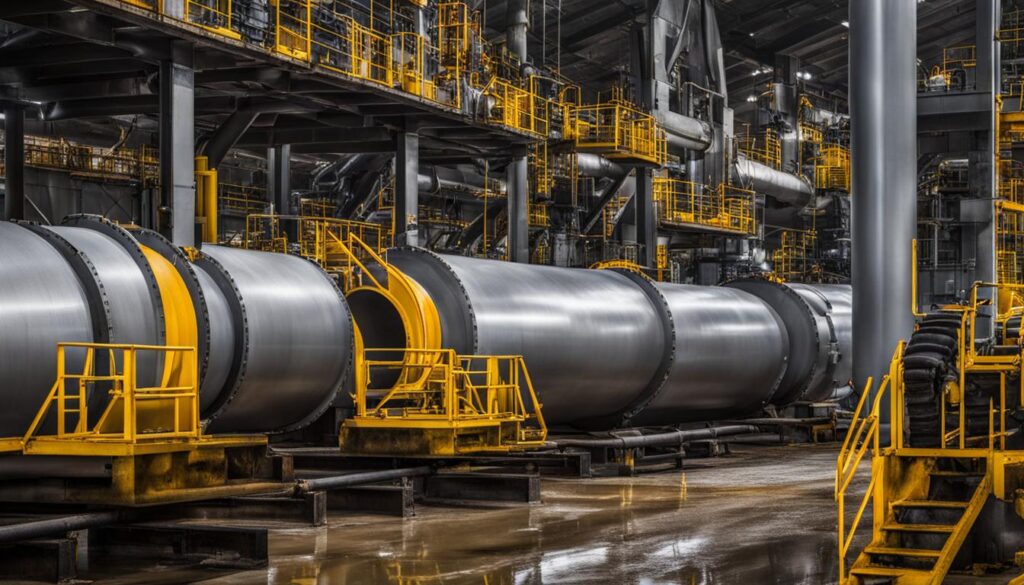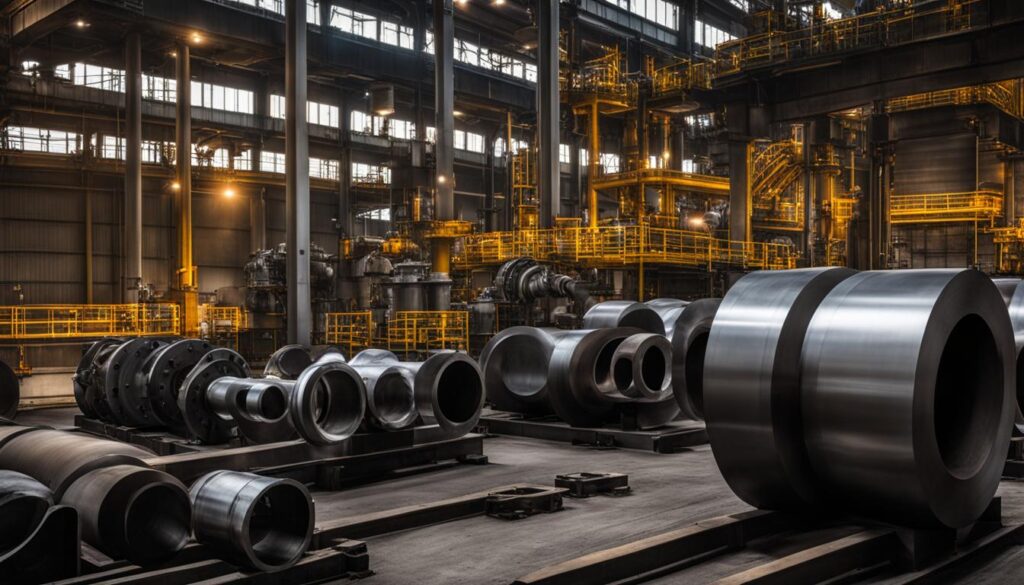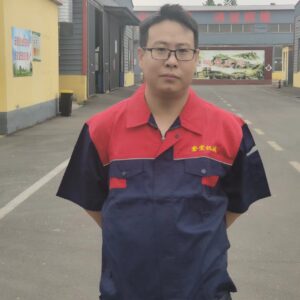As a mainstay in the oil and gas sector, alloy steels are iron-based materials containing carbon and various alloying elements, such as manganese, chromium, nickel, and vanadium. These elements grant alloy steels unique properties, including increased hardness and corrosion resistance. KT-Foundry specializes in alloy steel castings, offering high-strength, durable, and corrosion-resistant solutions to withstand the demanding conditions found in oil and gas operations. Innovations in production technology have led to energy-efficient manufacturing processes that enhance the longevity of these products while reducing waste through recyclability.
Key Takeaways
- Alloy steels play a vital role in the oil and gas industry due to their unique properties, which include increased hardness and corrosion resistance.
- KT-Foundry specializes in producing high-quality, energy-efficient alloy steel castings for the oil and gas sector.
- Alloy steel types, such as 4330 and 4340, offer benefits like high-strength drilling equipment and aerospace component efficiency in oil and gas operations.
- Advanced manufacturing techniques contribute to more sustainable alloy steel production, meeting the industry’s environmental goals.
- Alloy steels’ inherent recyclability further reduces environmental impact and supports KT-Foundry’s commitment to eco-friendly practices.
Understanding Alloy Steel and Its Role in the Oil and Gas Sector

Alloy steel’s versatile properties have made it a critical component in the oil and gas industry. The robustness and adaptability of alloys like 4330 and 4340 have led to their use in applications demanding both high-strength drilling equipment and aerospace component efficiency. KT-Foundry’s alloy steel castings have become the go-to solution for meeting the demanding environments present in oil and gas operations.
Quality is a vital aspect of alloy steel production, and at KT-Foundry, we ensure this through:
- Stringent quality checks
- Energy-efficient production
- Potential for end-of-life recycling
These practices demonstrate our commitment to both the environment and the industry’s needs for high-performance materials.
“Alloy steel properties contribute greatly to the oil and gas industry’s need for robust and versatile materials that can perform under high-stress environments.”
The following table illustrates the significant characteristics of 4330 and 4340 alloy steels:
| Alloy Steel | Strength | Heat Resistance | Corrosion Resistance | Applications |
|---|---|---|---|---|
| 4330 | High | Good | Good | High-strength drilling equipment |
| 4340 | Very High | Excellent | Very Good | Aerospace components and other oil and gas applications |
To meet the demands of the oil and gas sector, we at KT-Foundry continue to innovate and optimize our alloy steel castings. With our focus on sustainability and performance, we provide a strong foundation for a prosperous and eco-friendly future in the industry.
Key Alloy Steel Types and Their Applications in Oil and Gas Operations

Several types of alloy steel play a significant role in the oil and gas industry, specifically 4330, 4340, and 300M. Each of these alloy steels serves essential purposes, providing high-performance materials and unique properties, making them valuable in the demanding conditions of oil and gas operations. Let’s take a closer look at these key alloy steel types and their applications in the industry.
4330 Alloy Steel: High-Strength Drilling Equipment
4330 alloy steel, known for its high tensile strength and toughness, is widely used in the aerospace and defense industries for manufacturing aircraft landing gear. In addition, its durability and strength make it an excellent choice in the oil and gas sector for manufacturing drilling and exploration equipment. KT-Foundry’s alloy steel castings take advantage of 4330 alloy steel’s durability, contributing to energy-efficient and sustainable practices, focusing on the long lifespan of components and recyclability.
4340 Alloy Steel: Enhancing Aerospace and Defense with Versatility
4340 alloy steel is selected for its exceptional strength-to-weight ratio in applications such as aerospace landing gears, airframe parts, and military equipment. KT-Foundry’s versatile alloy castings employ 4340 alloy steel in casting industrial tools and automotive parts due to its wear resistance and ability to withstand prolonged stress. Moreover, these castings implement eco-friendly manufacturing processes to reduce emission technologies and increase resource efficiency.
300M Alloy Steel: Impact on Aerospace Component Efficiency
The lightweight and strong 300M alloy steel is commonly utilized in aerospace applications for aircraft landing gear and structural components. Its integration with composite materials enhances the aerodynamic efficiency of various components. KT-Foundry prudently chooses 300M alloy steel for parts necessitating low density yet high strength, such as helicopter rotor blades. By forging 300M alloy steel with advanced heat treatments, its properties are optimized for peak performance.
KT-Foundry’s alloy steel castings demonstrate the value of combining high-strength and versatile alloy steels, providing optimal solutions for oil and gas operations and ensuring efficiency, sustainability, and durability.
In conclusion, 4330, 4340, and 300M alloy steels play an essential role in aerospace applications, the defense industry, and oil and gas equipment. Through their unique properties and the expertise of KT-Foundry, these alloy steel castings maximize their potential to create high-performance materials that not only meet industry demands but focus on energy efficiency and sustainability for a greener future.
Advancements in Alloy Steel Manufacturing for Energy Efficiency
With the growing demand for energy-efficient alloy steel in the oil and gas industry, advanced manufacturing techniques and sustainable steel production have become paramount. At KT-Foundry, we constantly strive to improve our production methods, offering innovative solutions that cater to industry requirements while aligning with global sustainability goals.
In our quest for energy-efficient alloy steel production, we leverage advanced melting technologies such as electric arc furnaces. These furnaces enable precise control over temperature and process parameters, reducing energy consumption and carbon emissions compared to traditional blast furnaces.
“Electric arc furnaces offer significant advantages in terms of energy efficiency and environmental footprint when compared to conventional blast furnaces.”
Optimized heat treatment processes also play a key role in our energy-efficient alloy steel manufacturing. Our specialized processes for steels such as 8620 and 9310 enhance their mechanical properties, resulting in superior performance and durability in oil and gas applications. By refining our heat treatment techniques, we not only conserve energy but also significantly reduce material waste and production time.
Incorporating lean manufacturing principles into our operations has further enabled us to minimize waste and maximize resource efficiency. By streamlining our production processes, we can produce high-quality castings with a reduced environmental impact.
| Manufacturing Innovation | Energy Efficiency Benefit | Environmental Impact Reduction |
|---|---|---|
| Electric Arc Furnaces | Lower energy consumption, precise process control | Reduced carbon emissions |
| Optimized Heat Treatment Processes | Improved material properties, minimized waste | Resource conservation, energy savings |
| Lean Manufacturing Principles | Streamlined production, maximized resource efficiency | Decreased waste, improved environmental footprint |
As industry leaders in energy-efficient alloy steel production, we understand the importance of balancing economic growth with environmental stewardship. By integrating advanced manufacturing techniques and sustainable steel production methods, we at KT-Foundry are committed to providing superior alloy steel castings for the oil and gas industry while maintaining our dedication to a greener future.
The Environmental Benefits of Using Alloy Steel in Oil and Gas Projects
One of the essential objectives for most industries today is to implement sustainable solutions that minimize environmental impact. The oil and gas sector has also recognized this need, and the use of sustainable alloy steel has been highly acknowledged for its eco-friendly production and material recyclability. The following section explores the green manufacturing practices and recycling potential that alloy steel provides when used in oil and gas projects.
Eco-Friendly Production Processes and The Recycling Potential
Alloy steels, such as those produced by KT-Foundry, are manufactured with minimal environmental impact, focusing on practices that lower greenhouse gas emissions and maximize material efficiency. Among these practices is the use of innovative technologies that reduce energy consumption during production and the commitment to environmental stewardship throughout the alloy’s life cycle.
Employing eco-friendly operations in steel production processes plays a pivotal role in minimizing the industry’s carbon footprint, while optimizing product quality and performance.
Understanding material recyclability is essential for harnessing the full potential of these sustainable alloy steels. The inherent recyclability of alloys like 4340M can be analyzed through life cycle assessment, evaluating their environmental impact from production to disposal. This practice ensures that the alloy steel remains useful even at the end of its life in oil and gas applications, as it can be re-melted and repurposed, reducing the need for raw material extraction.
| Alloy Type | Recycling Potential | Environmental Impact Reduction |
|---|---|---|
| 4340M | High | Significant |
| 4330 | High | Significant |
| 300M | Moderate | Considerable |
| 8620 | Moderate | Considerable |
Emphasizing environmental stewardship, KT-Foundry has committed to eco-friendly operations by employing green manufacturing practices and taking initiatives to enhance sustainable alloy steel usage in oil and gas projects. This approach not only helps reduce the environmental impact of these industries but also offers long-term benefits in material recyclability and efficiency.
Conclusion
In the oil and gas industry, alloy steel castings have emerged as essential components offering strength, versatility, and sustainability. With KT-Foundry’s commitment to employing innovative techniques and eco-friendly practices in alloy steel production, they continue to provide durable and reliable solutions that cater to the demanding requirements of oil and gas operations. Their care in selecting the right alloys, including 4330 and 4340 alloy steels, ensures the castings possess the necessary properties for optimum performance in this critical sector.
The emphasis on sustainable practices by KT-Foundry in both the production and recycling of alloy steel promotes greener solutions for oil and gas projects. By leveraging advanced manufacturing methods and considering the material lifecycle from cradle to grave, their products are firmly rooted in sustainable oil and gas solutions. These practices not only contribute to conserving natural resources but also strengthen efforts to reduce greenhouse gas emissions in our quest for sustainable development.
As the industry continues to evolve, KT-Foundry is steadfast in its commitment to deliver high-quality alloy steel castings and support cleaner, greener operations in the oil and gas sector. Their continuous drive for industry innovations and ever-growing environmental consciousness places them at the forefront of the sustainable future, effectively blending high-performance materials with vital sustainability goals. This approach ensures that their products and practices bring both effectiveness and responsibility to increasingly demanding industries, making KT-Foundry a standout force in the field of alloy steel castings.
FAQ
What are the key properties of alloy steel in the oil and gas industry?
Alloy steels are iron-based with carbon and varied alloying elements such as manganese, chromium, nickel, and vanadium, granting unique properties such as increased hardness, corrosion resistance, and durability. These properties make them essential for the demanding conditions of oil and gas operations.
How does KT-Foundry contribute to the oil and gas sector with its alloy steel castings?
KT-Foundry specializes in alloy steel castings, delivering high-strength, durable, and corrosion-resistant products tailored for the high-stress environments of the oil and gas industry. The company ensures the high quality of their alloy steel through stringent quality checks, energy-efficient production, and the potential for end-of-life recycling.
What are some common alloy steel types used in oil and gas operations?
Alloy steel types such as 4330, 4340, and 300M are widely used in oil and gas operations. 4330 alloy steel is known for high tensile strength and toughness, while 4340 offers an excellent strength-to-weight ratio. 300M alloy steel is utilized for its lightweight construction and compatibility with composite materials.
How is KT-Foundry improving energy efficiency in alloy steel manufacturing?
KT-Foundry incorporates advanced melting technologies like electric arc furnaces, optimized heat treatment processes, and lean manufacturing principles to improve energy efficiency in alloy steel production. These advancements also enhance the environmental footprint, aligning with sustainability goals and providing superior castings for the oil and gas industry.
What are the environmental benefits of using alloy steel in oil and gas projects?
KT-Foundry focuses on minimizing the environmental impact of alloy steel production by employing eco-friendly practices, such as reducing greenhouse gas emissions and maximizing material efficiency. The inherent recyclability of alloys and the lifecycle assessment of their environmental impact from production to disposal are part of KT-Foundry’s commitment to sustainable operations.


